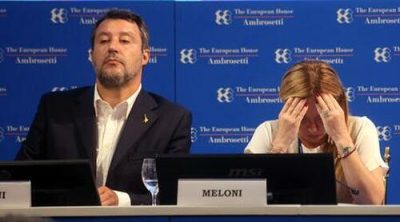‘End Energy Sanctions Against Russia Because We Are on Our Knees’: Italy’s Salvini Breaks Ranks

All Global Research articles can be read in 51 languages by activating the “Translate Website” drop down menu on the top banner of our home page (Desktop version).
To receive Global Research’s Daily Newsletter (selected articles), click here.
Follow us on Instagram and Twitter and subscribe to our Telegram Channel. Feel free to repost and share widely Global Research articles.
***
European solidarity continues cracking amid growing protests in different corners of the EU, with citizens angry at the collective policy of “standing up to Russia” in support of Ukraine at all costs. For example, Germany’s Foreign Minister Annalena Baerbock days ago openly expressed that she’s committed to support Ukraine “no matter what German voters think.”
But elsewhere, Italy’s League party leader Matteo Salvini, (which the mainstream media consistently dubs as “far-right wing” – though he would describe his party as the government of “good sense”) on Sunday broke ranks with other European leaders who have lately seemed to echo some form of this ‘Ukraine first’ policy.
On Sunday Salvini urged an end to Russia energy sanctions which are only leaving Europeans “on their knees” due to higher energy bills and lack of supply. “Several months have passed and people are paying two, three, even four times more for their bills,” he said in an interview RTL radio. “And after seven months, the war continues and Russian Federation coffers are filling with money.”
He explained that not only are the sanctions not working, but they hit Italy harder. While saying he stands in solidarity with Ukraine, he’s not willing to stick with something obviously counterproductive where the blowback is felt more in Europe, Italy in particular with its soaring energy import prices, and not the intended target of the Putin government.
This was the same message he issued to a gathering of Italy’s political leaders on Lake Como, where he stressed that Russia’s export surplus of $140 billion is the direct result of these backfired sanctions.
“Do we have to defend Ukraine? Yes,” Salvini said. “But I would not want the sanctions to harm those who impose them more than those who are hit by them.” Politico meanwhile noted his coalition is expected to win big in late September national elections:
Salvini’s remarks come just weeks before Italians head to the polls on September 25 in a national election in which a right-wing coalition that includes the League is expected to win. His comments could therefore raise concerns about the future government’s resolve against Russia among other EU politicians, especially given one of Salvini’s allies in the coalition, Brothers of Italy leader Giorgia Meloni, has vowed to stand firm with NATO on tough measures against Moscow.
Salvini called for a rethinking of current tactics, but still vowed that if in power his League party won’t stop backing Ukraine. “If we get into government will we change alliances? No. We remain deeply, proudly and firmly rooted in a free and democratic West that opposes war and aggression,” he explained. “But if we adopt an instrument to hurt the aggressor and after seven months of war it has not been hurt, at least considering a change seems legitimate to me.”
“We certainly need a European shield, like during COVID,” Salvini said of collective measures which could be more sensible in lowering energy prices and saving jobs:
“In place of sanctions, which were supposed to hurt the Russians, it would be better to protect the Italians and Europeans with a shield, a parachute,” Salvini said on the stump for the September 25 general election in the northern town of Bolzano.
“The only emergency in this moment are electricity and gas bills. It is serious that one side of politics does not understand this,” he said referring primarily to the center left. “It is a continental and national problem”.
Naturally (and just like is typical in US political discourse), the mere suggestion of backing down from any sanctions currently on the table resulted in his political opponents labeling Salvini essentially a Putin puppet.
Meanwhile, in the UK, where leaders have long demanded the population “sacrifice” for the sake of Ukraine…
#ThisMorning has turned completely dystopian and Black Mirror by offering to pay energy bills as a competition prize. pic.twitter.com/hs1DD6NXbo
— Scott Bryan (@scottygb) September 5, 2022
Foreign Minister Luigi Di Maio of the Together for the Future party charged that Salvini’s comments stem ultimately from wanting to “do [Vladimir] Putin a favor.” Di Maio said in a Sunday media interview: “The issue of sanctions is very clear in the Italian right: They don’t have a line,” while at the same time Enrico Letta, the leader of the center-left Democratic Party, quipped: “I don’t think Putin could have said it better.”
But underscoring that the proverbial chickens are about to come home to roost, Reuters on Monday writes in the wake of Salvini’s warnings that “Italy’s net energy import costs are set to more than double this year to nearly 100 billion euros ($99.5 billion), the economy minister said, warning Rome could not spend indefinitely to cushion the blow on the economy.”
*
Note to readers: Please click the share buttons above or below. Follow us on Instagram and Twitter and subscribe to our Telegram Channel. Feel free to repost and share widely Global Research articles.
Featured image is from Zero Hedge

